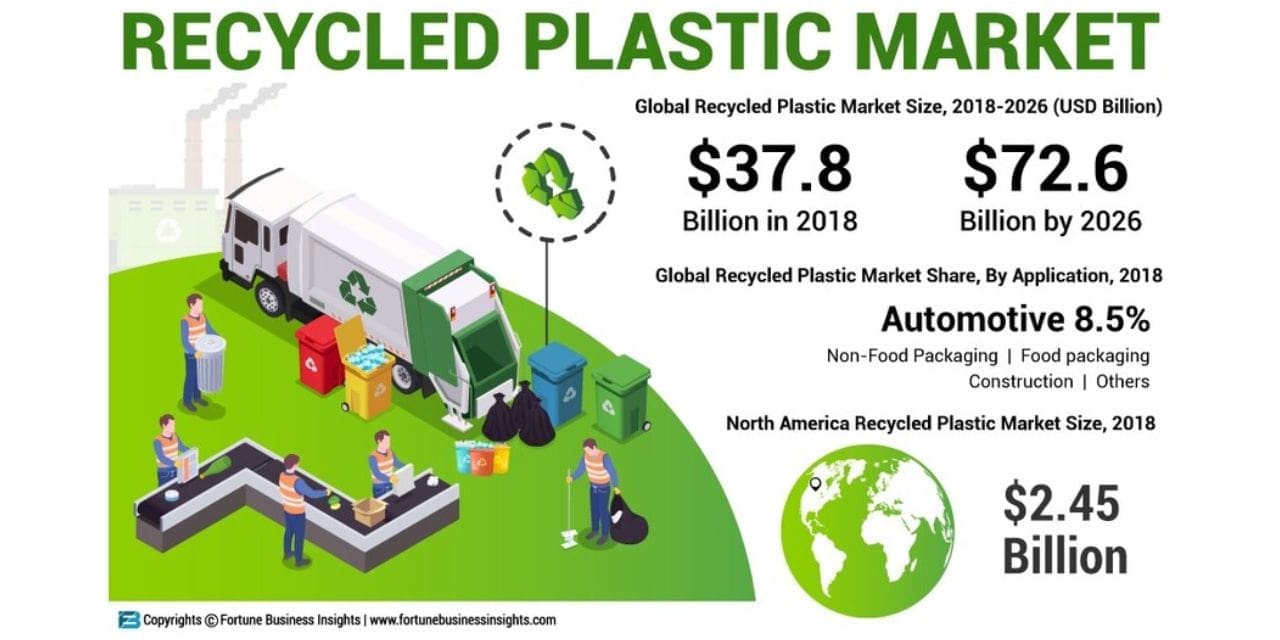According to a new market research report, the “Post-consumer Recycled Plastics Market by Polymer Type, Service, Processing Type (Mechanical, Chemical, Biological), End-use Application (Packaging, Building & Construction, Automotive, Furniture, Electronics), and Region – Global Forecast To 2025″,The global post-consumer recycled plastics market size is projected to grow from USD 14.2 billion in 2020 to USD 18.8 billion by 2025, at a CAGR of 5.7% from 2020 to 2025. The increasing urban population, rapid industrialization, growing concern toward the environmental impact of the improper disposal of plastic waste, along with laws & regulations regarding the disposal and treatment of plastic waste, have propelled the growth of the global plastic waste management industry. The increase in the GDP of a country will enable it to work with more advanced and effective waste management solutions, which will, in turn, increase the demand for waste management services, equipment, and technologies.
Download PDF Brochure:
https://www.marketsandmarkets.
Browse
- 153 Market data Tables
- 42 Figures
- 197 Pages and in-depth TOC on“Post-consumer Recycled Plastics Market – Global Forecast to 2025”
This report also provides a comprehensive analysis of the companies listed below:
Veolia Environnement S.A. (France), SUEZ (France), Waste Management Inc. (US), Republic Services Inc. (US), and Stericycle Inc. (US)
COVID-19 impact on global post-consumer recycled plastics market
Various plastic recycling companies are finding ways to communicate with their customers to help assure them in these difficult times by providing information on their website and social media on how they are tackling the global challenges faced by the company. Various plastics recyclers are not only ensuring the safety and quality of their raw materials but also the health and well-being of their employees. The COVID-19 situation has slowed down the growth of the plastics recycling industry owing to the social distancing and lockdown imposed by various countries across the world. These measures to fight the pandemic have created disruption in the supply & demand chain. The collection, sorting, and recycling process has been hampered owing to the impact of COVID-19 on the industry.
https://www.marketsandmarkets.
PP is estimated to be the fastest-growing segment in the post-consumer recycled plastics market from 2020 to 2025.
PP, by polymer type, is estimated to be the fastest-growing segment in the post-consumer recycled plastics market from 2020 to 2025, in terms of volume. Products made from PP offer high stiffness, heat resistance, steam barrier properties (food protection), elasticity (film and fiber applications), enhanced transparency, strong impact & rigidity balance. The resistance of PP to permeation is equivalent to or marginally better than that of high-density polyethylene (HDPE) and superior to low-density polyethylene (LDPE). It is recyclable and reused in various applications besides manufacturing plastics. These properties have led to an increasing preference for PP in the manufacture of packaging units used in the food & beverage, pharmaceutical, electronic, and packaging industries. Few packaging applications include bottles, crates, films, and pots.
The APAC region is projected to account for the largest share in the post-consumer recycled plastics market during the forecast period.
The APAC region is projected to lead the post-consumer recycled plastics market, in terms of both value and volume from 2020 to 2025. The growing population, rising GDP, and increasing disposable income in APAC are leading to the generation of more solid waste, which, in turn, is creating opportunities for plastic recycling in the region. According to the OECD Development Centre’s Medium Term Projection Framework (MPF-2019), GDP in the emerging Asian region is projected to grow by an annual average of 6.1% between 2020 and 2025.

